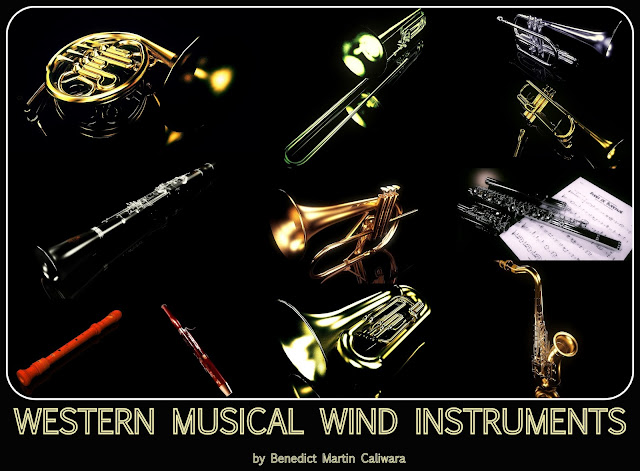Western Musical Wind Instruments: Visual Presentation
Music can
be appreciated through auditory experience. As an alternative way of appreciating
music, we may also look through the different instrumental craftsmanship
focusing on design, form and visual appearance of different musical instruments. For this presentation, I was able to produce
different digital images of Western wind instruments through the help of 3D modeling programs.
Musical
Instruments Model from: 3D Warehouse
Render by: Benedict
Martin Caliwara
Program Used: SketchUp8, Kerkythea, Photoshop,
Picasa
Wind
instruments generate tone through a vibrating column of air enclosed in a tube
or a pipe. The two classes of wind instruments are (1) woodwind and (2) brass.
Wood winds
Wood winds,
with the exception of the flute, produce vibration by means of a single reed or
double reed.
Single-
Reed Instruments
The
principal single-reed instruments are clarinets and saxophones, both of which
are made in various sizes and have correspondingly different registers.
Double-Reed
Instruments
The
principal double-reed instruments are the oboe, the English horn, the bassoon,
and the contra bassoon.
Flute and
Piccolo
The flute
and piccolo (the latter is the highest-pitched instrument in the band or
orchestra) produce tone by air blown across a mouth hole. In the older type of
flute called a recorder, the air is blown from the end into a whistle like
mouthpiece.
Brass
Instruments
The tones
of brass instruments are produced by vibration of the player’s lips pressed
into a cup-shaped mouthpiece. Change of pitch is effected both by lip pressure
and by the manipulation of valves. There are four principal brass instruments.
Horn
The horn,
or French horn as it is often called, is derived from the seventeenth-century
hunting horn. The horn has a wide compass and produces rich, full tones.
Trumpet
The trumpet
has a brilliant tone. The cornet, which is similar to the trumpet, has a more
mellow tone. Both are used in bands and orchestras, and there is an increasing
solo literature for these instruments.
Trombone
The
trombone may be regarded as the bass of the trumpet, but it has a more mellow
tone that the trumpet. It adds tremendous sonority and power to the brass
choir.
Tuba
The tuba is
the lowest brass instrument of the band and orchestra. Tubas are made in
various sizes and shapes.













Comments
Post a Comment